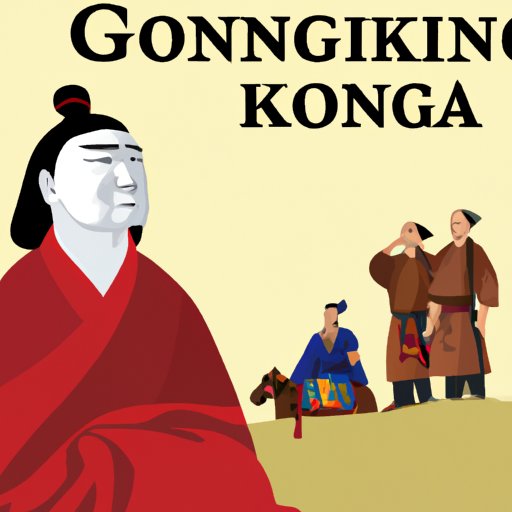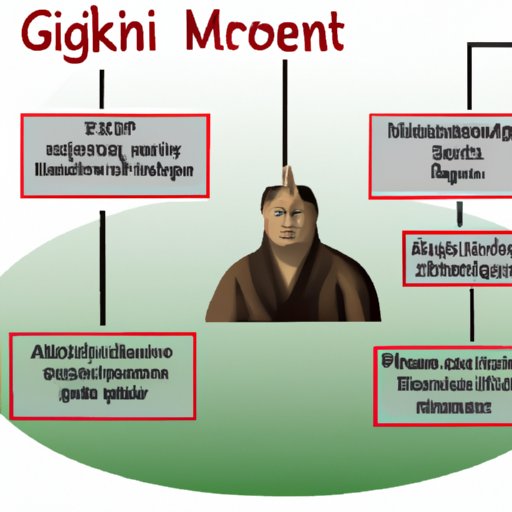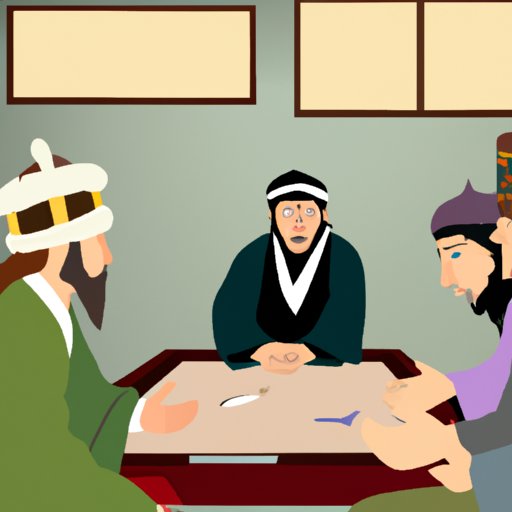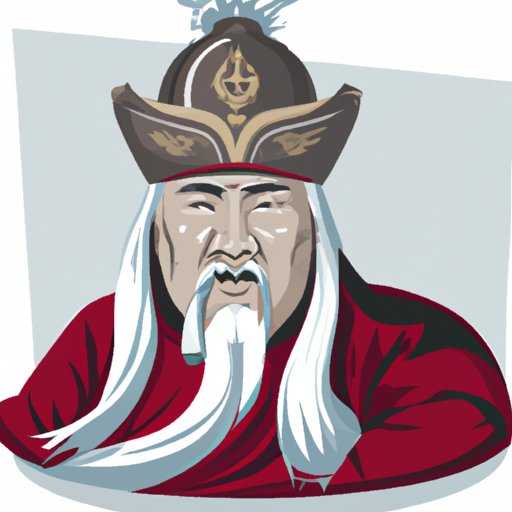Introduction
Genghis Khan is one of the most famous rulers in history. Born as Temüjin in Mongolia in the 12th century, he founded the Mongol Empire and led it to become one of the largest land empires in history. But was Genghis Khan a great leader? In this article, we’ll explore his military, political, social, religious, and cultural legacy in order to answer this question.
Who Was Genghis Khan?
What makes a great leader? According to a study by Harvard Business Review, effective leaders possess certain qualities, such as strong communication skills, self-awareness, empathy, and the ability to inspire others. To better understand Genghis Khan’s leadership, let’s first look at his life and background.
Genghis Khan was born in 1162 CE in what is now Mongolia. He was the son of a chieftain of the Borjigin tribe, and from an early age, he was exposed to the tribal conflicts and struggles that characterized the steppes of Central Asia. At the age of 13, he united the Mongol tribes and became their leader. In 1206, he was proclaimed Genghis Khan, which means “universal ruler” in Mongolian, by a council of Mongol chiefs.
Genghis Khan was a skilled warrior and strategist who was determined to expand the Mongol Empire. During his reign, he conquered much of Central Asia, including modern-day China, Iran, Iraq, and parts of Russia and India. By the time of his death in 1227, the Mongol Empire was the largest contiguous empire in world history, stretching from Korea to Hungary.
Examining the Military Conquests of Genghis Khan
Genghis Khan’s rise to power was fueled by his military successes. Let’s take a closer look at his strategies for success and the impact of his conquests on Central Asia.
Genghis Khan’s Early Life and Rise to Power
Genghis Khan began his career as a minor chieftain of the Mongol tribe. After his father died when he was nine years old, he was taken prisoner by a rival tribe and enslaved. However, he managed to escape and reunite the Mongol tribes under his leadership. In 1206, the Mongol chiefs declared him Genghis Khan, and he set out to conquer the surrounding territories.
His Strategies for Military Success
Genghis Khan was a masterful strategist who developed innovative techniques for warfare. He divided his forces into smaller units to quickly overwhelm and defeat larger armies. He also employed psychological warfare tactics such as feigned retreats and surprise attacks to demoralize his enemies. He also used diplomacy to negotiate alliances with other tribes and conquer their lands without bloodshed.
The Impact of His Conquests on Central Asia
Genghis Khan’s conquests had a major impact on Central Asia. He eliminated rival tribes, unified many of the nomadic peoples of the region, and established the Mongol Empire. He also established trade routes throughout the region, which helped spread goods and ideas between East and West. Finally, he introduced a new writing system based on Uyghur script, which allowed the Mongol Empire to communicate more effectively.

Exploring the Political and Social Legacy of Genghis Khan
In addition to his military conquests, Genghis Khan also left a lasting political and social legacy in Central Asia.
Establishing the Mongol Empire
Genghis Khan created the Mongol Empire, a powerful and unified state that stretched from modern-day China to Hungary. He established a centralized government with himself as the supreme ruler, and he created a code of laws known as the Yassa, which outlined regulations for taxation, justice, and trade. The Yassa also prohibited practices such as slavery and torture.
Laws and Institutions He Created
Genghis Khan also established several institutions to help govern his empire. He created a postal system to facilitate communication, and he organized a census to document the population of his empire. He also created a merit-based system of appointments to reward loyal subjects and fill important positions in the government.
Relationships with Other Cultures
Genghis Khan also had a great interest in other cultures. He encouraged intermarriage between the Mongol and Chinese elites, which helped to integrate the two cultures. He also opened diplomatic relations with other nations and welcomed foreign ambassadors to his court. He even adopted some aspects of Chinese culture, such as the use of Chinese characters for writing.

Analyzing the Motivations and Goals of Genghis Khan
Genghis Khan had a clear vision for the future of the Mongol Empire. Let’s take a closer look at his motivations and goals.
His Vision for the Mongol Empire
Genghis Khan was determined to create a unified and powerful empire. He saw the Mongol Empire as a tool for unifying the nomadic peoples of Central Asia and protecting them from outside threats. He also sought to establish a prosperous and peaceful state that would be respected by its neighbors.
His Desire for Expansion
Genghis Khan also had an ambition for conquest. He believed that the Mongol Empire should continue to expand until it encompassed the entire world. He set out to conquer the surrounding territories, believing that it was his destiny to unite all of humanity under one rule.
His Ambition for Legacy
Finally, Genghis Khan was driven by a desire for legacy. He wanted to be remembered as a great leader who had brought prosperity and peace to the world. He took great care in appointing competent administrators and establishing laws and institutions that would ensure the longevity of his empire.

Discussing the Religious Impact of Genghis Khan on Central Asia
Genghis Khan had a complex relationship with religion. Let’s examine how his actions affected the religious landscape of Central Asia.
His Promotion of Tengriism
Genghis Khan was a follower of Tengriism, the ancient religion of the Mongols. He promoted the religion throughout his empire and encouraged the practice of shamanism. He also required his subjects to pay tribute to Tengri, the sky god, and incorporated elements of Tengriism into his political system.
His Respect for Other Religions
Despite his promotion of Tengriism, Genghis Khan was tolerant of other religions. He allowed Muslims and Buddhists to practice their faith freely, and he even allowed Christian missionaries to enter his territory. He also protected Jewish merchants from persecution.
His Role in the Spread of Islam
Genghis Khan also played an important role in the spread of Islam in Central Asia. He allowed Muslim missionaries to preach in his empire, and he converted to Islam himself. He also granted Islamic scholars special privileges and protection. As a result, many of his subjects converted to Islam, and it eventually became the dominant religion in Central Asia.
Investigating the Cultural Contributions of Genghis Khan
Genghis Khan also made significant contributions to the culture of Central Asia. Let’s explore his influence on art, music, and literature.
His Influence on Art, Music, and Literature
Genghis Khan was a patron of the arts. He encouraged the production of art, music, and literature and commissioned works from both Mongol and foreign artists. He also established libraries and academies to promote learning and scholarship. As a result, the Mongol Empire became a center of artistic and literary activity.
The Development of the Silk Road
Genghis Khan also played an important role in the development of the Silk Road. He established trade routes between the Mongol Empire and the Middle East, which allowed goods and ideas to travel between East and West. This increased commerce and cultural exchange between the two regions.
The Preservation of Ancient Manuscripts
Finally, Genghis Khan ordered the preservation of ancient manuscripts from Central Asia. These manuscripts contained valuable information about the history and culture of the region, and they are still studied today.
Evaluating Genghis Khan’s Leadership Style
Genghis Khan was a successful and influential leader. Let’s evaluate his leadership style.
His Role as a Strategic Planner
Genghis Khan was a masterful strategist. He developed innovative techniques for warfare and was able to quickly overwhelm larger armies. He also employed psychological warfare tactics and used diplomacy to negotiate alliances with other tribes. He was an astute planner who was able to anticipate the needs of his empire and act accordingly.
His Ability to Inspire Loyalty and Devotion
Genghis Khan was also able to inspire loyalty and devotion in his followers. He was a charismatic leader who rewarded loyalty and punished betrayal. He was also able to motivate his soldiers with stories of glory and honor, and his troops were willing to follow him into battle.
His Use of Fear and Intimidation
Finally, Genghis Khan was not afraid to use fear and intimidation to maintain control. He was ruthless in punishing those who defied his rule, and he often resorted to violence to achieve his goals. While this may have been necessary to maintain order in his empire, it also alienated many of his subjects.
Conclusion
Genghis Khan was a remarkable leader who achieved great success during his lifetime. He established the Mongol Empire, a powerful and unified state that stretched from modern-day China to Hungary. He also developed a code of laws and created institutions to help govern his empire. He was a masterful strategist who employed innovative tactics for warfare and was able to inspire loyalty and devotion in his followers.
However, Genghis Khan was also ruthless in his methods, and his use of fear and intimidation alienated many of his subjects. He also destroyed cities and massacred entire populations in the pursuit of his ambitions. Ultimately, whether or not Genghis Khan was a great leader depends on personal opinion.
(Note: Is this article not meeting your expectations? Do you have knowledge or insights to share? Unlock new opportunities and expand your reach by joining our authors team. Click Registration to join us and share your expertise with our readers.)
